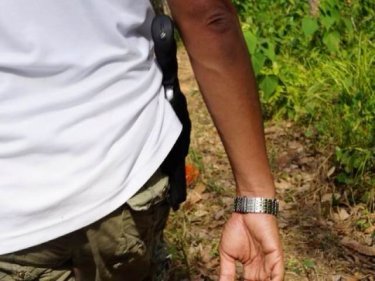He's keen to find and arrest the ''kingpin'' and his network of brokers before they disturb the balance of village life in southern Thailand.
Loyal Thai Muslims all along the Andaman coast either support the trade in flesh or are becoming opponents of it. The more the trade continues, the greater the divisions are becoming in many villages.
US educated, Police Major General Thatchai Pitaneelaboot was put in charge of the Immigration units in all 14 southern provinces late last year. He has a firm belief that all Thai people have a right to know what's happening.
So, in planning a raid yesterday on a secret trafficker's camp not far from the city of Had Yai, he opted to bring along Phuketwan and other media with an interest in the Rohingya issue.
It was a low-key raid and at the first encounter with a group of men who were potentially armed and dangerous, the commander pulled back. By the time a second reinforced sally was made a couple of hours later, the Rohingya - estimates were as many as 300 men, women and children - had been escorted away hurriedly to another hiding place.
Left behind were children's clothing and hairclips, indicating there were some women with offspring involved, rough latrines and scraps of paper containing telephone numbers.
The deserted camp was close to the spot marking an earlier camp that a Phuketwan reporter skirted in December after a survivor spoke of deaths occurring there each day for a fortnight, of rapes observed by onlookers and of regular beatings during telephone calls to extract money from family and friends.
Most of the Rohingya, Major General Thatchai believes, are now being shipped from Burma to the Thai border port of Ranong from where they are trucked overland to the secret camps in Thailand's south, around Had Yai.
''People make more money that way than by taking them via the sea,'' he said. ''So when the Rohingya get to Thailand, it's the relatives who pay.''
Brokers along the Andaman coast north of Phuket, less involved these days because of the competition for Rohingya from a growing number of residents and non-residents, say that the southern traffickers are far more brutal.
It's easy to see how camps for hundreds of people can be hidden in the vast rubber plantations around Had Yai, ribbed with rough trails that can if necessary take small trucks.
Commander Thatchai is aiming to step up the raids in coming weeks. ''If the traffickers don't have camps they are not going to make any money,'' he said.
Sunday's experience showed, though, that the traffickers are well supported by a network of allies and it only takes a word from one man in uniform, or a village spy keen to make some extra cash, for a warning to precede the raiders.
The young, honest local guide who led the group into the plantations on Sunday had to flee his home today. The brokers in a neighboring village know who he is, so, believing that trafficking is wrong, he has become a fugitive.
Thailand's Dr Surin Pitsuwan warned last year when he was still Secretary-General of Asean that the Rohingya issue has the potential to destabilise the entire region unless it is resolved within Burma. Muslim villages in Thailand's south are already becoming divided between the traffickers and the non-traffickers.
Unless the trade in humans can be stopped at its source, in hearts and minds inside Burma, trafficking through Thailand is likely to grow, along with greed. Commander Thatchai and the small number of villagers who think it's wrong are all that stands in the way.










Good try, but badly planned. Why wouldn't you have Helicopters and enough Police to take control of the place?
Police should know its heavily armed and supported by certain Military in Thailand.
Always seems to be an escape route, even here on Phuket when they raid illegal lumber camps. They always seem to get away.
Who knows if its a facade or real. Lets hope he means it and it's the latter.
Posted by Tbs on February 25, 2014 11:35